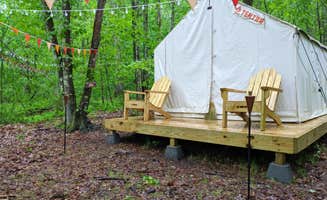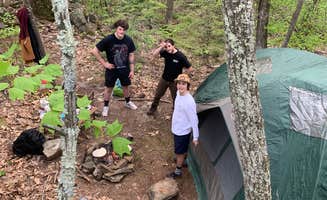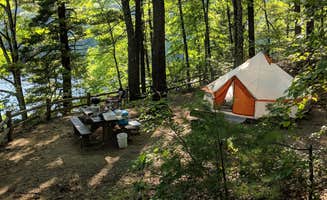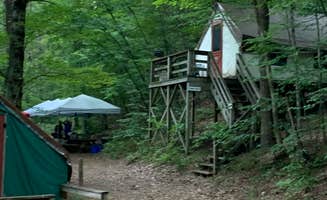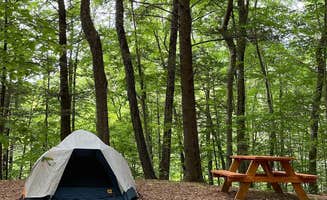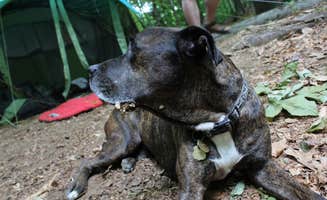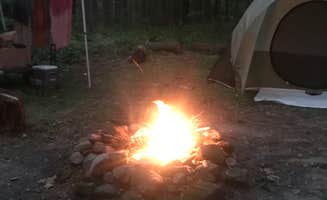Tent camping near Ludlow, Massachusetts offers a mix of rustic sites and cart-accessible experiences across varied woodland terrain. Western Massachusetts averages 45 inches of annual rainfall, creating lush forests and occasional muddy conditions during spring camping season. Most primitive sites in this region are located in state forests or along reservoirs, with many requiring special access procedures.
What to do
Water activities on Tully Lake: Tully Lake Recreation Area offers excellent paddling opportunities with canoe and kayak rentals available onsite. "We take our canoe and spend the whole day at the lake. You can find lots of private areas to swim, pick blueberries and relax," explains Ben P. The lake features numerous islands and inlets to explore during day-long paddling excursions.
Waterfall hiking: Several campgrounds provide access to local waterfalls within walking distance. The quick walk to Doane's Falls from Tully Lake is particularly accessible. According to Jean C., "The highlight was Doane's falls, a very quick walk from the campground area," making it perfect for campers seeking short nature excursions without driving.
Mountain biking trails: The region's forests contain extensive trail networks suitable for off-road cycling. As Miguel B. notes about Tully Lake, "You can hike and bike (mtb). Nearby there are waterfalls (gorgeous) and a local mountain," providing options for both casual riders and more experienced mountain bikers on varied terrain.
What campers like
Privacy levels between sites: Onion Mountain Park offers secluded options for those seeking isolation. "We ended up finding a very primitive spot off the blue trail (on top of the mountain), where we settled down for the night. The spot is not very big so make sure to bring a smaller tent," advises Nora S. Smaller tents work best at these more isolated locations.
Cart-based camping systems: Many campgrounds utilize wooden wheelbarrows for transporting gear from parking areas to campsites. Stacey W. from Tully Lake comments, "I even like that it's rustic and you can't drive your vehicle to the site. They have carts to haul your stuff." This creates quieter camping environments without vehicle noise.
River access for cooling off: During summer months, riverside camping provides natural swimming spots. At Zoar Outdoor, the proximity to water recreation stands out. Seth K. notes it's "close to where locals jump off outcrops into the lazy river and hang out on the river side," offering natural swimming holes during hot weather.
What you should know
Reservation timing considerations: Popular campgrounds fill quickly during peak season. For Tully Lake, Nancy R. advises, "There are some prime camp sites with direct access to the lake, but suggest you be prepared to call early in the morning of the first day State Campground reservations can be made, if you want one of these!" Some sites open for booking months ahead.
Variable cell service: Most remote camping areas have limited connectivity. Jean C. notes about Federated Womens Club State Forest, "Cell phone coverage is faint to nonexistent on Verizon. You may want to download offline maps before you head out here." Download necessary maps and information before arriving.
Water access logistics: Not all campgrounds provide drinking water. Jean C. also points out about Federated Womens Club State Forest, "Bring your own water. There is a composting toilet located near the group site in the field." Plan to pack in all needed water for remote locations without services.
Tips for camping with families
Site selection for children: Prioritize campsites with level ground and minimal hazards. At Barton Cove Campground, Brie B. notes, "sites are fenced in due to how steep it is to the water which was a downside but views between the trees are nice," providing important safety features for families with young children.
Car-free camping benefits: Several campgrounds prohibit vehicles at campsites, creating safer environments for children. Megan G. appreciates that at Tully Lake there are "No cars at all at the campsites, which was great for peace of mind as our toddler roamed around. It also made for a super quiet stay."
Bathroom distance planning: For families with small children, consider bathroom proximity when selecting sites. Lauren A. from Tully Lake cautions, "Our site was fairly far from services, long run with small kids in the middle of the night," suggesting families select sites closer to facilities.
Tips from RVers
Railway cabin alternative: For RV campers seeking unique alternatives, Chester Railway Station offers caboose accommodations. Esther L. shares, "The caboose is stationed on a big grassy field, near a real railroad. It sleeps 4 and you can set up tents outside too. You hear the trains running at night." This provides a novel lodging option when not using an RV.
Group site accommodations: Buck Hill Campground features large clustered sites suitable for multiple families camping together. Greg R. explains, "All the sites are in large clusters (each can accommodate 10+ tents). Many of the sites are also along Wakefield Pond," making it ideal for family reunions or large groups traveling with multiple RVs and tents.


